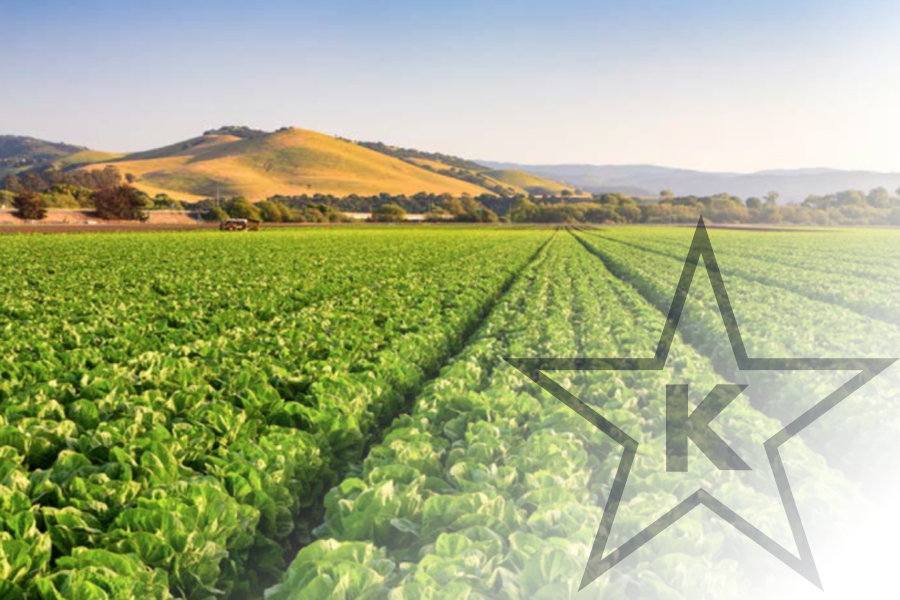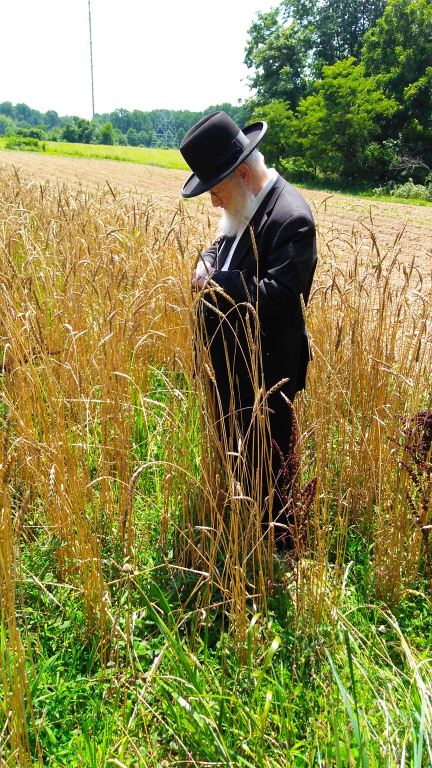
Yoshon: To Keep or Not to Keep
Winter 2024
The Gemara seems to conclude that the prohibition on the consumption of chodosh applies worldwide.[1] However, many shomrei mitzvos outside Eretz Yisrael do not restrict themselves to eating only yoshon grain. Various reasons have been proposed:
► The Rema says that people rely on the fact that for any particular product that are two uncertainties. It is possible that there the food was made from a previous year’s wheat crop and is yoshon. It is also possible that this year’s crop took root before 16 Nissan and is yoshon. As there are two areas of doubt – a sfek sfeika – one can be lenient.[2] Others disagree and maintain that there is only one uncertainty here, whether the grain is chodosh or yoshon, and one should be stringent.[3]
► The Bach says that the prohibition does not apply to grain produced in a field owned […]
![[WEBINAR] Yoshon Simplified](/images/news_5_t.jpg)
[WEBINAR] Yoshon Simplified
STAR-K Kashrus Administrators Rabbi Zvi Goldberg and Rabbi Sholom Tendler explain Yoshon.

Yoshon & Pas Yisroel Guidelines
Updated November 19, 2024
This page is dedicated in memory of Rav Yosef Herman הרב יוסף בן הרב יהושע זצ”ל, who is credited with singlehandedly raising awareness about Yoshon in America and throughout chutz la’aretz and renewing the klal’s commitment to this precious mitzvah. He undertook the responsibility to conduct extensive research about Yoshon products and to publish Yoshon updates year after year without remuneration. May all of our work be an aliyah for his neshama.
Latest Updates from the Kashrus Agencies
The Yoshon season is now in full swing. Updated product information can be found on yoshon.com or in the STAR-K Quick Reference Guide.
Disclaimers about Date Code Discrepancies
GOLD MEDAL and PILLSBURY
There is still some uncertainty regarding the expiration codes for these flours, as these can be processed at many different mills, with expiration codes varying between 12-18 months for All Purpose and Bread flour, and can be as […]

Yoshon Season Has Officially Started (Guides Included)
http://matzav.com/yoshon-primer-as-season-begins/
http://baltimorejewishlife.com/news/news-detail.php?SECTION_ID=1&ARTICLE_ID=64754
Yoshon season has officially started. Many people get confused about what the terms Yoshon and Chodosh are. Here we present a brief explanation of each, followed by some product information.
The Torah (Vayikra 23:14) states that the new (i.e., Chodosh) crop of the five grains may not be eaten until after the second day of Passover (i.e., in Israel; in the Diaspora, not until after the third day). This means that the grain harvested this summer would not be allowed until after Passover of next year (i.e., 2016/5776). The term Yoshon (literally, old) refers to crops harvested last summer that became permitted after the following Passover. Thus, the 2014 crop of grains, harvested last summer, became permitted after this past Passover (i.e., 2015/5775). Grain planted at least two weeks (see Dagul Mervava Y.D. 293) or more before Passover is permitted upon harvest since it took root before […]

Yoshon and Chodosh Something Old and Something New
The story is told about how in the mid 1970’s the proprietor of a kosher bakery in an Orthodox Jewish neighborhood was asked if his products were Yoshon. Not realizing that this Hebrew word, which literally means ‘old’, actually refers to grain which had been planted before Passover, proudly, albeit naively, answered, ” I can assure you that everything in my bakery is 100 percent fresh.” Today, as we approach the millennium yoshon and chodosh have graduated and become household words which have rightfully taken their place among the more popular terms such as Glatt Kosher, Cholov Yisroel, and Pas Yisroel.

Glossary of Terms
Submit Request to Add New Term
Alos Hashachar – dawn
Bar Mitzvah – a 13-year-old boy who is required to observe the commandments; also refers to the celebration commemorating the boy reaching that age
Bas Mitzvah – a 12-year-old girl who is required to observe the commandments; also refers to the celebration commemorating the girl reaching that age
Batul – nullified
Birkas Hamazon (“the Grace After Meals”) – blessing after a meal that included bread
Bishul Akum – food cooked by a Gentile
Bishul Yisroel – food prepared under the supervision of a mashgiach
Bris Milah – circumcision of a baby boy, usually when he is eight days old
Brachos – blessings
Charoses – a symbolic mixture of fruit, wine and nuts eaten at the Passover seder meal
Chatzos Halylah – midnight (halfway between sunset and sunrise)
Chatzos Hayom – midday (halfway between sunrise and sunset)
Chodosh (lit. “new”) – a grain from the “five species” (wheat, barley, oats, rye and spelt) […]

Destination Simcha: From Meat Board to Surfboard
Winter 2025
Forty years ago, the Lakeshore Hebrew Day School of New Orleans celebrated its 10th Anniversary Dinner in one of the premier hotels in the Vieux Carré, under the supervision of the local Orthodox rabbi. The day school then housed the New Orleans Kollel, of which I was a member. The event was so special that my Rosh Yeshiva, Rav Henoch Leibowitz ztz”l, was brought in as the guest speaker.
Before the event, we met extensively with the hotel chef, the pastry chef, and the food and beverage director to ensure that – even though the hotel was kosher certified – there would be no kashrus hiccups. When the big day arrived, I came with a crew made up of the chevrei hakollel to supervise the cooking for the event. Imagine our alarm when the chef showed us the “kosher” soup kettle – gleaming on the inside but encrusted with crawfish […]

Pas Yisroel Guidelines 5785
The Shulchan Aruch (O.C. 603:1) states that during the Aseres Yimei Teshuva, even those who are generally not stringent about only eating Pas Yisroel should do so, and avoid eating bread items baked by an aino Yehudi, known as Pas Palter.
Bread (or pas) is defined as baked goods that are made from the five primary grains: wheat, barley, oats, rye and spelt. All other grains are not considered pas. Cooked or fried items are also NOT considered “bread” items[1] for Pas Yisroel purposes.
It is important to note that if a Yehudi is involved in any part of the baking process (e.g., he only turned on the fire or oven or placed the food into the oven), that is enough to render any items subsequently baked to be considered Pas Yisroel. Just preparing the dough is not enough. Additionally, […]

What’s “New” in Chodosh
Winter 2024
The Torah states[1] that chodosh (new) crops of the five grains may not be eaten until after the second day of Pesach (outside of Israel, not until the third day).[2] Thus, grain harvested in the summer of 2023 would not be allowed until Pesach 2024. On the other hand, yoshon (old) crops, which were harvested in the summer of 2022, became permitted after Pesach 2023. Grain planted at least two weeks or more before Pesach are permitted upon harvest, since they took root before Pesach.[3]
Outside of Israel, there are various customs based on numerous sources as to whether or not one needs to be stringent about using only yoshon products (see Rabbi Mordechai Frankel’s article in this issue). Each person should consult their rav for guidance. In Israel, however, these leniencies do not apply. Therefore, any product from Israel bearing a reliable kosher […]

The Knead to Know: The Rise of Sourdough
Fall 2023
We are all familiar with the Torah’s directive to rid our homes of chometz in order to prepare for Pesach. The Torah uses two terms when instructing us in the cleaning process: chometz and se’or.
Ask any talmid or talmida: “What is chometz,” and you will get a very erudite response. Ask the next question: “What is se’or,” and seven out of ten will shrug and say, “I dunno,” while the other three might venture, “Sourdough?” When you follow up and ask them to define sourdough, most – if not all – will say, “I dunno!”
Today, more and more homes are seeing sourdough boules find their way into their bread baskets. With its “rise” in popularity, it is only natural that we look into this new trend and ask, “Ma nishtana sourdough bread from its conventional counterpart? Are there halachic and practical differences?”
Wheat and Bread Making Fundamentals
Let’s begin by reviewing […]

Who Has Whom…Over the Barrel?
Kashrus Kurrents, Spring 2023
The immortal words of Koheles, “l’kol zman va’eis” – there
is a time and a place for everything – rings true in all of life’s twists and turns
and is certainly relevant in the world of kashrus and kashrus standards. Kosher
food certification has grown exponentially, and standards have improved with
age. Who would have dreamed that pas Yisroel, bishul Yisroel, and
cholov Yisroel would be available to the wider kosher marketplace?
Forty years ago, a can of tuna with bishul Yisroel and hashgacha
temidis was a rare commodity. Many a yeshiva would resort to stam cholov
when cholov Yisroel wasn’t available, something that would be
unheard of half a century later. Yoshon was an anomaly, except for the
meticulous few; today, yoshon is a kosher household term and it
continues to proliferate.
These amazing developments across a variety of industries are a
testament to the tireless diligence of kashrusagencies who strive to
provide the kosher consumer with the finest […]

Wanting the Best for Our Children: Meeting Kashrus Challenges in Yeshiva, Camp, and Day School Kitchens
Kashrus Kurrents, Winter 2023
Kashrus has come a long way over the
past fifty years. Agencies ensure the highest standards of kashrus in factories
and food establishments worldwide, with experts in halacha, food technology, equipment,
and ingredients. Consumers have been trained to know which products are acceptable
and how to maintain a kosher kitchen l’mehadrin.
However, one area of kashrus that
has received far less attention – even throughout the past several decades of unprecedented
kashrus growth – is kashrus in our schools. This is due to several inaccurate reasons,
including the following:
Myth #1: “Religious teachers are in
the building all day and they oversee kashrus and everyone is careful.” Realistically, this is not the case.
Unless a teacher is told to “be on top” of the situation, only minimal oversight
will typically occur. Unfortunately, not everyone is familiar with the intricacies
of kashrus, and without guidelines a lot can go wrong.
Myth #2: “Unlike a for-profit eating
establishment, which obviously needs oversight […]

Global Brands Team Up with STAR-K in Israel
Recognizing
the high demand for popular brand name food imports with a Mehadrin hashgacha
in Israel was the impetus three years ago for opening our STAR-K Israel office.
We felt uniquely qualified to begin working with Israel’s largest food
distributors due to our reputation of always maintaining a high degree of
professionalism, our food technology expertise, and worldwide presence in the
global marketplace.
STAR-K
was fortunate in teaming up with Rabbi Ahron Haskel who, with his many years of
experience, accepted our offer to become director of STAR-K Israel[1].
Along with his keen understanding of the intricacies of the Israeli food market
and the high regard that both kashrus professionals and food distributors have
for Rav Haskel, he was the perfect choice for this newest STAR-K venture.
Distributors such as Israel Beer Breweries Ltd (IBBL)/Coca-Cola, Osem/Nestlé, Strauss,
and Tnuva were equally pleased with the new opportunities to import Mehadrin
products for the Israeli public.
Something to Drink To!
STAR-K
has also been very active in providing the […]

Life is Not a Dress Rehearsal: Making Your Simcha a Star Performance
Summer 2018
The joy, the planning, the anticipation, the expense — there is a lot that goes into a Yiddishe simcha. Be it a chasuna, Bar Mitzvah, or bris – every significant life cycle event is extra special, and the baalei simcha want to ensure that their guests have a good time. Central to that goal is a delicious seudas mitzvah. Endless hours of planning are spent making sure everything is perfect, from the décor to the menu. Is the same effort expended regarding the kashrus level of the event?
If the simcha is being catered, does the caterer have reliable kosher certification? As catering costs have risen, consumers have opted to cater their own simchas. This article will attempt to address some key issues that one should consider when self- catering an event.
The Kiddush
Pre-planning your Kiddush is the best strategy to guarantee that the simcha will encounter a minimum amount […]

Fresh from the Field: Staying Up To Date On Insect Checking/Bedikas Tolayim Part 1
Halachic issues of infestation in many of the fruits and vegetables that we consume are well known. Much has been written and said about these issues, albeit to various degrees of halachic stringency. This article will focus on the methods used to monitor this evolving industry. Doing so requires both monitoring of the various produce items, as well as keeping track of their sources on an ongoing basis. This is easier said than done! We will explore the challenges inherent in accomplishing these objectives and discuss some of the more recent items that have surfaced on the infestation radar screens.
The world of entomology is ever evolving. Chaza”l1 stress the importance of knowing the facts in each locale, as the variables that affect insects and infestation change constantly. It used to be that due to their short shelf-life, produce was mainly sourced locally. Knowing the infestation issues inherent in each location […]

From Wheatfield to Pesach Table: STAR-K Kosher Certification Takes You Behind the Scenes at Migrash Farm
The hefty $20-$50 price per pound of handmade shmura matzah may cause you to raise your eyebrows, especially when comparing it to the price of machine-made matzah, but if you only knew what goes into manufacturing the crisp, paper-thin, artisanal specialty item you would understand why it is so pricey.
To keep up with the increasing demand for handmade shmura matzah, matzah bakeries around the world start baking as early as October! But, actually, the labor-intensive process of producing STAR-K certified shmura flour began a few months before, in July. That is when HaRav Moshe Heinemann visited the 28-acre Migrash Farm—located inside the Chesapeake Watershed, just a stone’s throw from STAR-K’s Baltimore headquarters. The farmer, R’ Yosef Hertzmark, who doubles as a STAR-K menaker, accompanied the Rav as he walked the fields to supervise the shmura wheat harvest, deeming its extra level of scrutiny– “shmurah m’shaas ketzira” (guarded from the time […]

‘Beer Halacha’: Clarifying The Kashrus of Beer
Published Winter 2014
Hashem , in his ultimate kindness, has provided man with the keys to unlock some of nature’s most amazing secrets. For centuries, a great secret has been revealed to man – the bubbling elixir known as beer.
Beer’s ingredients – water, barley, yeast and hops – bear no resemblance to the finished product. These natural ingredients undergo a series of simple yet fascinating processes to convert them into one of the world’s most popular beverages. It is not coincidental that alcoholic beverages have been given the distinctive appellation “spirits”, alluding to the fact that these beverages seem to magically emerge from these natural ingredients as if they have been assisted by spirits. The four steps of beer making are malting, roasting, brewing and fermenting.
THE PROCESS : The first step of beer making combined barley and water in a process […]

Bishul Yisroel Sephardi: And Now For The Rest Of The Story
Published Spring 2014
If anyone ever visited New Orleans, one of the must-see tourist highlights in Metairie, a suburb of New Orleans, is a quaint Cajun wooden floor coffee shop known simply as Morning Call. Morning Call is a café that sold one product only – a delightful, deep fried square doughnut that you smothered with heaps of confectioners’ sugar and enjoyed along with a delicious hot cup of French market coffee. These square doughnuts are known as beignets (pronounced ben y’ays). I don’t know if a beignet matches a fresh jelly-filled sufgania , but beignets are a New Orleans favorite and Morning Call is still frying beignets.When I was a member of the New Orleans Kollel many years ago, Morning Call was certified kosher by the local congregational rabbi, and at that time there was no Kosher Cajun restaurant to go to for a kosher bite to eat. The proprietor of Kosher Cajun was […]

A Halachic Guide to Seudas Shabbos and Lechem Mishna
Summer 2014 | Updated August 2024
One of the highlights of the week is the Shabbos seuda. The divrei Torah, zemiros, Shabbos delicacies, family and guests allow us to come closer to the Ribbono Shel Olam and recharge our ruchniyus and gashmiyus (spiritual and physical) batteries. Although a delicious bowl of chicken soup on Friday night and hot cholent during the daytime seuda enhance the Shabbos meals, one does not fulfill his obligation of Seudas Shabbos with either of these items. What is necessary to fulfill one’s obligation for Seudas Shabbos?
I. Seudas Shabbos
Men and women are obligated to eat three meals every Shabbos. Each “meal” must consist of bread.1 Chinuch-age children are also obligated. On Yom Tov, one2 is obligated to eat only two seudos as there is no obligation for a third meal.
Ideally, one should eat the volume of a k’beitza v’yoser[...] Read More

Inspections In All Directions
Published Winter 2015
The STAR-K certifies tens of thousands of products manufactured across the globe. There are well over a million ingredients and products certified by hundreds of kashrus agencies worldwide. The following example may provide an idea of how many products are kosher certified.One million different products that are in containers measuring 6 inches in diameter lined up side by side (with no space between them) would stretch from Manhattan to Philadelphia. Since there are considerably more than a million kosher certified products, and industrial products are often sold in wider containers (e.g., 55 gallon drums), this line of products would most likely continue all the way to Baltimore. Furthermore, every kosher certified item (i.e., every container of every kosher product certified by every reliable kashrus agency) would easily stretch from the earth to the moon.To certify all of these products, kashrus agencies must adequately communicate with companies and mashgichim […]

Maintaining Proper Standards of Kashrus In Our Yeshivos & Schools
Published Fall 2013
Kashrus has come a long way. Kashrus agencies ensure the highest standards of kashrus in factories and food establishments worldwide, by maintaining a staff of experts in halacha, and in food technology, equipment and ingredients. Consumers have been trained to know which products are acceptable and how to maintain a kosher kitchen l’mehadrin. Kashrus in shuls is usually overseen by the rav of the kehila.
However, one area of kashrus that has received little attention – even throughout the past several decades of unprecedented kashrus growth – is kashrus in our schools. These “heiligeh mekomos”, where tens of thousands of our “tinokos shel bais rabban” spend much of their time during the course of their formative years, deserve the same attention as factories, eating establishments, shuls and our homes.
It is difficult to address the needs of each school as every situation is different. The issues at a yeshiva with a full-service […]

Hotel Kashrus on the Front Lines
Rabbi Mayer Kurcfeld, Star-K Kashrus Administrator
Published Summer 2007
Introduction
The world of hotel kashrus is exciting, stressful and always a challenge. Effective hotel
kashrus demands a keen understanding of modern equipment and complex facility
dynamics, along with an excellent mastery of the hotel food and beverage industry. These
criteria are essential in facilitating the role of the administrator and mashgiach as respected members and powerful presence in the hotel kitchen. The role of the mashgiach, once typecast as that of an old man with a white beard sitting on a chair, has changed. Not only does the mashgiach need to know that dairy and meat must be kept separate, the “new-age” mashgiach must relate to the kitchen and serving staff with diplomacy and grace.

Planning Your Simcha; The Agony or Ecstasy
Published Summer 2007
The joy, the planning, the anticipation, the expense — there is a lot that goes into a Yiddishe simcha. Be it a chasuna, Bar Mitzvah, or bris, every significant life cycle event is extra special and the baalei simcha want to ensure that their guests have a good time. Central to that goal is a delicious seudas mitzvah. Endless hours of planning are spent making sure everything is perfect, from the decor to the menu. Is the same effort expended regarding the kashrus level of the event? If the simcha is being catered, does the caterer have reliable kosher certification? As catering costs have risen, consumers have opted to cater their own simchas. This article will attempt to address some key issues that one should consider when catering an event.

Kosher Certification-Food Safety Quality’s Eyes and Ears
Published Summer 2010
Earlier this year, a couple of items in the secular media caught my attention. I was particularly interested in them because they brought to mind how those who are not kosher observant view Kosher.

Star-K Side Bar Winter 2010
Other News From The STAR-K
STAR-K CERTIFICATION

Brachos for Breakfast
For the most updated Cereal List click here.
Published Winter 2012
Updated Winter 2019
STAR-K has researched breakfast cereals for the past 30 years and has published Brachos lists and halachic guidelines for these products based on the psak of Rabbi Moshe Heinemann, shlita, STAR-K Rabbinic Administrator. It is with great pride that STAR-K has begun certification of the following three cereals distributed by Nestle in Israel: Cheerios, Fitness, and Crunch Cereals. The hashgacha is coordinated by our newly expanded Israel office. The products bear a STAR-K symbol and are pareve, bishul Yisroel, and yoshon. The brocha rishona on all three cereals is mezonos and the brocha achrona is al hamichya.

Indulging L’Mehadrin
Published Summer 2012
Not too long ago, prior to the flood of Jewish children recordings, my children listened to a popular recording of birthday party songs. One popular song that stands out in my memory is the song beginning with the following lyrics:
Everyone loves ice cream, yes indeed they do,
Everyone loves ice cream, I do – do you?
Search the whole world over travel near and far,
‘Cause everyone loves ice cream, no matter where they are.

 STAR-D
STAR-D STAR-S
STAR-S